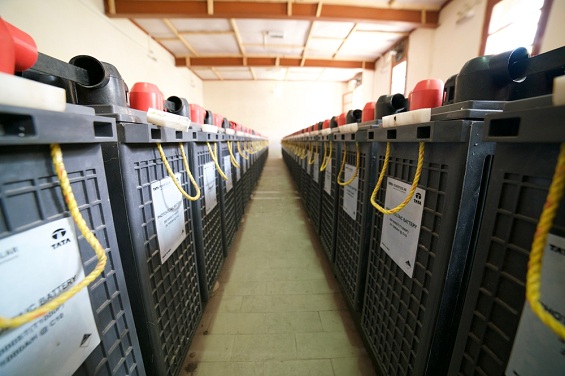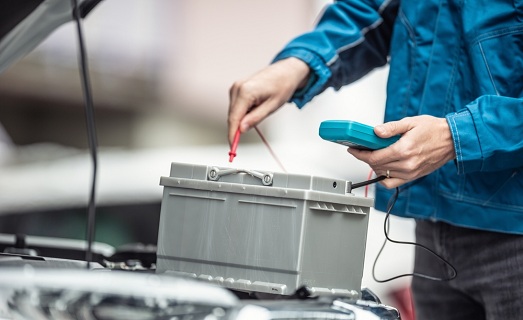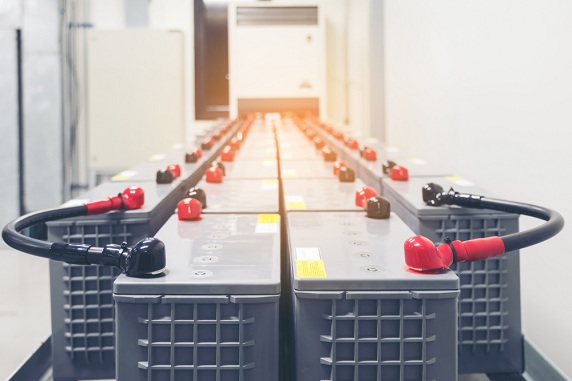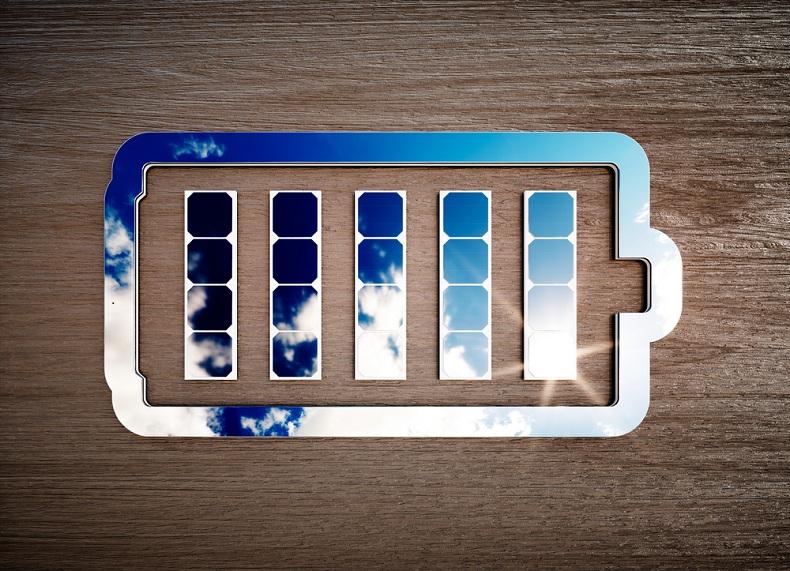Solar batteries are growing in popularity, but are they worth their high cost?
If you're considering installing a solar power system, you may have encountered the topic of battery storage. Many people still aren't familiar with battery systems despite their growing popularity.
A battery lets you store your solar panel's energy for later use. A hybrid solar system combines solar panels with solar batteries into one package. It offers several benefits, including reliable backup power and independence from your local electric company.
However, how do they work? But most important of all, how much do they cost?
Read on to find out.
How Solar Batteries Work
A solar battery stores the extra solar power your panel produces that you don't immediately need so that you can draw on it later.
Solar panels generate the most energy during the middle of the afternoon, which also coincides with the time when your house consumes the least amount of power. A regular grid-tie solar power installation sends any extra electricity generated during daylight hours back to the utility company.
If you pair solar power with a battery, that extra energy from the sun will go into the battery rather than the grid. When the sun sets and your solar panel isn't generating any power, you can use the power you've stored in your batteries instead of buying power from the utility company.
With this system, you can use all of the clean, green energy your solar panel produces at any time of day.
What's The Price Of Solar Batteries In 2022?

Solar batteries vary widely in price depending on their chemical composition. Some can be installed for less than $200, whereas others can cost up to $15,000.
Most residential grid-connected solar systems use lithium-ion batteries, costing between $7,000 and $14,000 to purchase and set up.
You can get small-capacity lead-acid battery packs for less than $200. Still, they're not going to be able to provide enough energy to run most homes and are usually used as an emergency backup for RV owners.
Solar battery costs have dropped significantly over the last few years, but they're still expensive. Most people don't have enough cash lying around to buy them.
Fortunately, solar batteries qualify for the 30 percent federal solar energy credits, and some states offer additional state-level incentives to lower their costs.
1. Solar Battery Manufacturer
Like any other product you purchase, the brand you select will affect the price of the battery. It’s because different brands provide different services and have different production methods.
For example, German battery manufacturer Sonnen offers a range of high-end solar batteries, some costing up to $30,000. On the other side, the Tesla Powerwall costs just $11,000.
2. Battery Chemistry
Lithium-based cells are the most common battery used for electricity storage in our homes today.
Two types of battery chemistry are used for solar cells: Nickel, Manganese Cobalt (NMC), and Lithium Ferro Phosphate (LFP).
NMC batteries (which include the LG Chem Prime) have been around for a couple of years now, so they’re slightly cheaper than LFP batteries (which include the Electriq PowerPod 2).
Some homeowners prefer using lead-acid batteries over lithium-ion batteries because they're cheaper, but they tend to have a short life span, less capacity, and need regular maintenance.
3. Number Of Batteries Installed

Installing additional batteries increases the cost of a solar energy storage system.
The number of solar batteries you'll need depends on the following:
Most often, if there is an electrical outage, one to two battery packs will be able to supply enough electricity for your basic household functions and provide some backup power to a few key systems.
4. Backup Load Panel
Most solar batteries cannot provide enough energy for every device in your home.
You'll be able to keep your most important stuff powered up, like your light bulbs and refrigerator. Still, you'll have to install several batteries to have enough electricity for your AC unit when there's no power.
Since batteries cannot provide enough energy for your entire home, you may want to consider installing an additional sub‐panel to ensure that only the most important parts of your home remain powered when there's no electricity available.
Adding sub-panels, sometimes called backup load panels or critical load panels adds another $1,000 – $2,000 to your installation costs.
5. Labor Costs
The labor involved in installing your battery system will also affect the cost of an installed home solar system.
If the battery is going in at the same time as installing the solar panel, the labor cost might be slightly less expensive since all the electrical wiring and permits for both systems would be done at once.
Suppose the batteries are being installed after the fact. In that case, there could be increased costs involved in adding them because new permits would need to be filed, incentives might be needed, and additional wiring would need to be done to link the batteries to the existing solar panels.
6. Incentives And Rebates
Solar batteries come with different costs depending on which solar battery incentive programs are available in your area and whether a professional installer or DIYer installs them.
California's Solar Battery Incentive Program (SGIP) can help homeowners install enough batteries to offset their electricity usage for up to 25 percent of the installation cost.
Some states, like Oregon, offer solar energy rebates that can lower upfront costs. If you're eligible for the federal solar tax credits, you can receive an extra 30 percent off the cost of your batteries, even if they aren't attached to solar panels.
Is it worth paying for an additional solar battery system?

While combining solar panels with an energy storage system is becoming more popular, it doesn't necessarily mean it's the best option for everyone.
Installing a solar panel battery storage system offers the greatest benefit to property owners who live in areas prone to frequent blackouts, where they don't receive full retail net metering rates, or where there are incentive programs for installing batteries.
Also, If your primary reason for going solar is the environment, then solar batteries are the best option because they maximize the use of renewable power.
On the other hand, if you're just trying to save some extra cash, a solar battery might not be worth it for your needs.
If you live in a place where there's retail net metering, you will save the same amount of money by installing a battery as you would not have one.
All the battery would do is add hundreds of dollars to your solar system and provide you with peace of mind if there’s an unexpected power outage.
We've got a detailed guide on how utility net-metered rates affect the cost of installing a solar battery system to help you understand what might be right for you.
Solar Panels And Solar Batteries Make A Great Pair
Installing a solar energy battery system can be a great strategy for maximizing the benefits of your solar panel installation.
Batteries are a good way to store extra electricity when there isn't enough power coming into your house. They help you become more independent by reducing your reliance on the utility company and sometimes can lower your electric bill.
However, solar batteries do cost some money. If you're trying to cut down on your energy bills, installing a solar battery may not be right, especially if your electric company offers net metering.
If you live in an area with frequent power outages, like those in parts of California and Texas, or in an area where TOU electricity rates exist, having a battery backup system will help ensure you're not left without power during these times.
On the plus side, the cost of solar batteries has continued to drop, which means that eventually, they'll be included by default in all new solar energy installations.
You must be careful when choosing a battery system for your solar power setup. Make sure you choose from several reputable companies to avoid paying too much for substandard installations.


